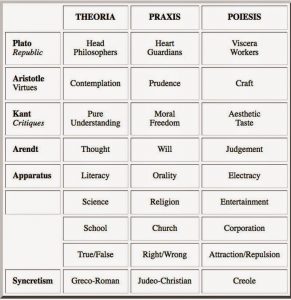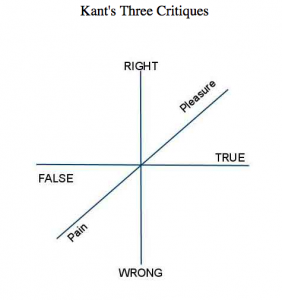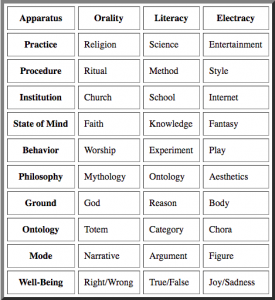Theopraxesis: Apparatus

Apparatus Orientation. Gauguin’s visualized catechism exemplifies the orientation (EPS) organizing the Western Tradition. The table on the left charts the isotopic alignments of Capabilities across the microcosm/macrocosm, individual and collective registers. The Western Tradition in our heuretic curriculum is configured to make explicit this system of relationships among the virtues and the popcycle. The theme takes many forms, one of which is the legend of the Golden Apple Paris awarded to Aphrodite in the context with Athena and Hera regarding which power was most desirable. The three goddesses represent the three virtues: Athena (Wisdom and War); Hera (Social and Political Power); Aphrodite (Sexuality and Fertility). Plato addressed the relationship among these powers in the Republic, advising a hierarchy of Head (Rulers), Heart (Guardians), Viscera (Workers), in that order. Education of the individual begins with Aphrodite (sexual desire, appetites), and follows the power of attraction upwards through the virtues to Hera’s realm of social custom, and finally on th Athena’s wisdom, knowledge of the Forms (Ideas) themselves: Beauty as such.
–Kant’s Critiques retrieve Aristotle’s Theoria, Praxis, Poiesis, Circumscribing the limits of each Capability: Pure Reason, Practical Reason, Judgment of Taste, with the Third Critique constituting an innovation that marks the beginning of Electracy–the promotion of the faculty of imagination (poiesis, aesthetics) to equal status with the other two faculties, which up to that point it did not have. Kant proposed his own version of the catechism, relative to these three powers: What can I know? What should I do? What may I hope? This system informed Alan Kay’s design of computer interface when he worked at Xerox Park. Navigation of information space should engage all three of the virtues (theopraxesis in our terms). The three inputs: Keyboard (Symbol, highest order conceptual, linguistic) = Athena; Mouse (enactive doing) = Hera; Windows (image, icon) = Aphrodite.
–Nested levels (mise en abyme): The table helps clarify that, however dispersed our exposition may become, this system configuration is consistently present, governing the transformation from potential to actual.
- Collective: Apparatus–Paleo, Oral, Literate, Electrate
- Collective: Popcycle Institution–Family, Church, School, Corporation
- Individual: Capability–Language, Will, Thought, Imagination
- Individual: Theopraxesis (Mystory Wide Image generate hypothesis from disposition)
- Meta: Mandala, Game, Engine, Drive [not yet discussed]


